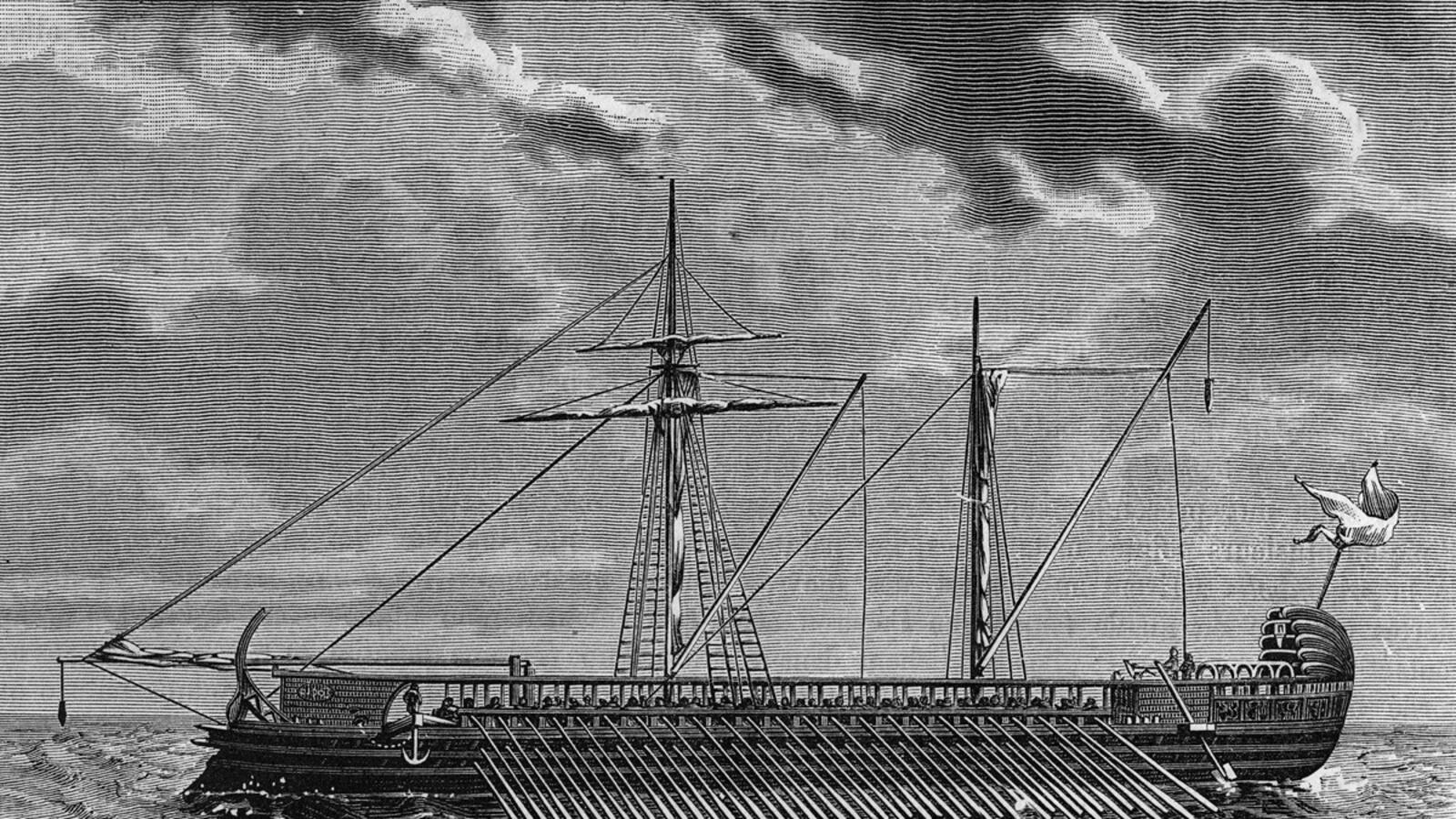The debate in the U.S. and Israel over attacking Iranian nuclear sites is a very modern dilemma, but history offers some surprisingly ancient parallels. Iran, it seems, has played the high-stakes game of advanced-weapons proliferation before—in the 5th century B.C., when it was known as Persia, and when the Western powers it confronted were the classical Greek city-states led by Athens and Sparta.
Athens rose to power early in that century by building a fleet of triremes, the oar-powered warships that conferred control of the sea. These light, sleek, maneuverable vessels were built on a highly sophisticated design, using a system of pegs and dowels, rather than nails and screws, to hold planks tightly together. To construct a fleet of them required time, expertise, and plenty of cash, so, as with nuclear weapons today, only a major power with major ambitions would attempt it.
Themistocles, the statesman who pioneered the Athenian fleet, understood what such advanced weapons meant for Athens’s strategic position. He devised a scheme that would look familiar to modern Israeli military planners: to preserve Athens’s military supremacy by knocking out all potential rivals. In a secret conclave he called for naval sorties that would set fire to the dockyards of other port cities around the Aegean. Athens could have not only supremacy in advanced naval weapons, but a long-term monopoly.
Had Themistocles’ plan been adopted, Greek history might have taken a very different course than it did. But contemporaries had qualms about launching unprovoked attacks. Aristides, a rival leader known for high moral standards, declared that he had never heard of any scheme more advantageous to Athens—or more unjust. The Athenians trusted Aristides and scuttled the plan.
The purpose of Athens’s navy was not only hegemony but national defense. In Themistocles’ day the city had a mortal enemy determined to crush it: the Persians, ancestors of today’s Iranians, and their aggressive king, Xerxes. The showdown in 480 B.C. between Xerxes’ forces and a coalition of Greeks, at Salamis, was the first big test for Athens’s three-year-old fleet. Designed for extra rowing power, Athens’s new ships proved faster and more nimble than older models used by the Persians, and Xerxes was routed. The golden age of Athenian sea power had begun.

The story of classical Athens is largely a tale of naval supremacy, as John Hale has recently shown in his book Lords of the Sea. Athens parlayed its fleet into a maritime empire, blockading and starving any subjects that defied her will. But Athens could not preserve its advanced-weapons edge forever.
In 410 B.C., some seven decades after their defeat at Salamis, the Persians jumped back into the “great game” of Aegean rivalry. Too smart to challenge Athens directly, they waged war by proxy, giving cash to Sparta, Athens’s sworn enemy, to build its own trireme fleet. Whole forests in northern Greece were felled, and rowers were recruited from every town and city, to bring this fleet to fruition. Spartan admirals quickly trained themselves for a new kind of war, and one of them, Lysander, mastered it very quickly.
Most Athenians living at that time had never seen their sea power challenged. Their sense of security was badly shocked when Spartan ships, fueled by Persian cash, first attacked their military convoys. Many must have wished that Themistocles’ long-ago plan for preemptive raids on Greek harbors had been put into effect. But it was too late. Lysander finally succeeded, in a well-timed raid on the Athenians’ naval base at the Dardanelles, in capturing nearly all Athens’s ships, crewmen, and naval gear. Athens surrendered and disbanded its empire.
But the “great game” did not end there. The Persians liked the power their cash reserves gave them to destabilize Greece. Having raised up a Spartan fleet to destroy Athens, they then opened their coffers to Athens and helped it rebuild. As in the modern Middle East, where Iran has often stirred up enmity between warring factions, the ancient Persians made it their mission to keep the Greeks at odds, and largely succeeded.

Sparta could not hold on long to naval dominion, but jealously tried to prevent Athens from regaining it. A Spartan general named Sphodrias mounted a commando raid in 378 B.C., aimed at burning Athenian dockyards—exactly the strategy Themistocles had advocated a century earlier. Once again, the course of history hinged on the outcome of a preemptive strike. But Sphodrias had miscalculated. Morning dawned before his night march had reached its objective, and he was forced to turn home in disgrace.
The era when trireme supremacy meant regional hegemony came to an end not long after that. The Macedonians under Alexander the Great and his father, Philip, made land warfare the new source of imperial power. But while it lasted, the age of the trireme anticipated issues facing today’s nuclear world. Then as now, a single advanced weapon loomed so large that nations tried to strip it away with surgical strikes—or else cloned it and altered the balance of power by letting the genie out of the bottle.






